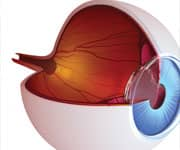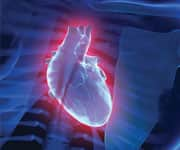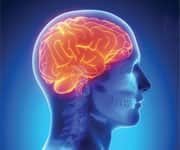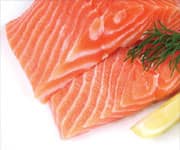Life Extension Magazine®
High Homocysteine, Low Folate, and B12 Predict Macular Degeneration | |
An article published in the American Journal of Clinical Nutrition reports the finding of a protective effect for higher levels of vitamin B12 and folate against the risk of developing age-related macular degeneration (AMD).* The study also revealed a greater risk of AMD in association with higher levels of homocysteine. Paul Mitchell and his colleagues analyzed data from 1,390 participants in the Blue Mountains Eye Study of common eye diseases. Eye examinations were conducted upon enrollment and at five, ten, and fifteen years. Serum homocysteine, folate, and vitamin B12 levels were measured and dietary questionnaires were completed at the five-year follow-up visit. From the five-year through the fifteen-year follow-up visit, 219 subjects were diagnosed with AMD. In comparison with those with lower homocysteine levels, participants whose levels were greater than 15 micromoles per liter had an up to 56% greater risk of AMD. Editor’s Note: Among those with deficient folate levels, the risk of AMD was up to 89% higher in comparison with the risk experienced by subjects with greater levels. Vitamin B12 deficiency also increased risk. —D. Dye | |
| Reference | |
* Am J Clin Nutr. 2013 May 1. | |
Critically Ill Have Reduced Levels of CoQ10 | |
An article published in the Journal of Critical Care revealed lower levels of coenzyme Q10 (CoQ10) in critically ill patients in comparison with healthy men and women.* The study compared 36 adult intensive care unit patients with 18 healthy controls. Septic shock was present in 12 of the critically ill subjects. While the lowest levels of plasma CoQ10 occurred in septic shock patients, levels were lower in critically ill patients both with and without septic shock in comparison with healthy subjects. Reduced levels of CoQ10 were also associated with increased age and with a decline in the ability to perform activities of daily living after hospital discharge. Authors Andrea Coppadoro and colleagues remark that CoQ10 supplementation has been associated with improvement in activities of daily living scores, neuromuscular function, and other long-term outcomes in certain groups, suggesting that supplementation could also benefit the outcome of the critically ill. Editor’s Note: The authors conclude that, “The data provide a rationale for further…clinical studies to define CoQ10 insufficiency and evaluate the safety and efficacy of CoQ10 supplementation in critically ill patients.” —D. Dye | |
| Reference | |
* J Crit Care. 2013 Apr 22. | |
Activation of SIRT1 Through Calorie Restriction or Drug Treatment Delays Neurodegeneration in Experimental Model | |
A recent issue of the Journal of Neuroscience reports an association between a calorie-restricted diet and a delay in the decline in brain function that occurs in a mouse model of neurodegeneration.* The study utilized a breed of mice in which neurodegeneration is induced by administration of the drug doxycycline. Li-Huei Tsai, PhD, and associates fed the animals a diet that reduced by 30% the amount of calories that would have been normally consumed by mice given unlimited food access. A control group of the same breed was allowed unlimited feeding. After three months on the diet, tests revealed not only less neurodegeneration but better cognitive function in the mice that received restricted diets. Examination of the animals’ brains revealed a reduction in the loss of neurons and greater brain mass and synaptic density in the restricted animals in comparison with those provided with unrestricted diets. Editor’s Note: The researchers found an increase in the expression of a protein believed to regulate life span known as SIRT1 in the hippocampus area of the calorie restricted animals’ brains as well as an increase in SIRT1 activity, which is consistent with other studies involving calorie restriction. When a separate group of mice were given a SIRT1-activating compound, benefits similar to those elicited by calorie restriction were observed. —D. Dye | |
| Reference | |
J Neurosci. 2013 May 22;33(21) 8951-60. | |
Gamma-Tocopherol Supplementation Boosts Smoking Cessation Benefits | |
The results of a study reported at the annual Experimental Biology meeting suggest a cardiovascular benefit for the form of vitamin E known as gamma-tocopherol among individuals who had recently given up smoking.* The study included 30 participants who had smoked at least 10 cigarettes per day for one year. Subjects were randomized to receive a solution containing 500 mg of gamma-tocopherol or a placebo for seven days. Ultrasound evaluation of brachial artery flow-mediated dilation (a measure of blood vessel function) was conducted, and plasma levels of cotinine, vitamin E, malondialdehyde, and pro-inflammatory mediators were measured before and after the treatment period. Flow-mediated dilation responses increased significantly among those receiving the supplement in comparison with subjects who received a placebo. While the placebo group experienced a 2.8% average increase in flow-mediated dilation by the end of one week, supplementation with gamma-tocopherol resulted in a 4.2% increase. Editor’s Note: Subjects who received gamma-tocopherol also experienced a decline in myeloperoxidase and tumor necrosis factor-alpha, indicating a reduction in inflammation. —D. Dye | |
| Reference | |
* Experimental Biology Meeting 2013. | |
Hypothalamus Found to Play Important Role in Aging | |
A small gland in the brain appears to have a powerful role in the aging process, according to research reported online in the journal Nature.* Dongsheng Cai, MD, PhD, and his colleagues at Yeshiva University evaluated inflammatory changes in the hypothalamus that have been associated with metabolic syndrome, a cluster of symptoms including glucose intolerance and central obesity. They found that activation in the hypothalamus of a protein known as nuclear factor kappa-beta (NF-kB), which is involved in inflammation, accelerated aging in mice. The researchers determined that activation of NF-kB reduced the synthesis of gonadotropin-releasing hormone (GnRH, which is involved with reproduction) by the gland. By injecting GnRH into the hypothalamus of older mice, the animals were protected from age-related impairment of neurogenesis. Long-term peripheral administration of the hormone resulted in a reduction in some of the signs of aging, including cognitive decline. Editor’s Note: In another experiment with mice in which the NF-kB pathway was inhibited, signs of aging were slowed in comparison with normal mice, and the modified animals experienced a 23% longer median life span and a 20% longer maximum life span in comparison with normal animals. Curcumin is a popular nutrient that inhibits NF-kB. —D. Dye | |
| Reference | |
* Nature . 2013 May 1. | |
Meta-Analysis Reaffirms Protective Effect of Preoperative Omega-3 Fatty Acids Against Postoperative Atrial Fibrillation | |
The results of an updated meta-analysis published in the Journal of Thoracic and Cardiovascular Surgery indicate that preoperative supplementation with omega-3 fatty acids provides significant protection against atrial fibrillation in open heart surgery patients.* The analysis included eight clinical trials evaluating the efficacy of omega-3 fatty acids for the prevention of atrial fibrillation following coronary artery bypass graft surgery and/or heart valve surgery in 2,687 men and women. A total of 398 atrial fibrillation events were documented postoperatively. Among subjects who received omega-3 fatty acids, there was a 16% lower risk of atrial fibrillation in comparison with those who received a placebo. When the analysis was limited to coronary artery bypass graft surgery patients, the reduction in risk associated with omega-3 supplementation increased to 34%. The authors remark that the benefit of omega-3 fatty acids observed in this study could be due to their anti-inflammatory property or a direct antiarrhythmic effect. Editor’s Note: Atrial fibrillation is the most common type of heart arrhythmia that occurs after heart surgery and can result in longer hospitalization and an increased risk of postoperative mortality. —D. Dye | |
| Reference | |
* J Thorac Cardiovasc Surg. 2013 Apr 12. | |
Ginger May Benefit Asthmatic Patients | |
The American Thoracic Society’s 2013 International Conference in Philadelphia was the site of a presentation concerning the ability of compounds that occur in ginger to relax airway smooth muscle tissue, which is constricted during asthma attacks.* Elizabeth Townsend, PhD, of Columbia University and her colleagues studied the effects of 6-gingerol, 8-gingerol and 6-shogoal in human airway smooth muscle tissue samples treated with acetylcholine, a neurotransmitter that causes bronchoconstriction. The compounds or a control substance were combined and administered with the beta-agonist bronchodilator drug isoproterenol. Combining the drug with ginger compounds resulted in greater airway tissue relaxation than administering the drug alone. The ginger compound 6-shogoal elicited the strongest effect. The researchers determined that the compounds help inhibit phosphodiesterase 4D (PDE4D, an enzyme that negatively impacts processes involved in the relaxation of airway smooth muscle tissue). Additionally, 6-shogaol was found to dissolve F-active filaments that are involved in bronchoconstriction. Editor’s Note: Dr. Townsend concluded that, “These data show that ginger constituents 6-gingerol, 8-gingerol and 6-shogaol act synergistically with the beta-agonist in relaxing airway smooth muscle, indicating that these compounds may provide additional relief of asthma symptoms when used in combination with beta-agonists.” —D. Dye | |
| Reference | |
* American Thoracic Society 2013 International Conference, Philadelphia, Pennsylvania. | |
Phosphatidylserine Holds Promise for Brain Disorders | |
In an article published in the journal Human Molecular Genetics, researchers at Tel Aviv University report that phosphatidylserine could be of benefit to individuals with familial dysautonomia, a disorder that occurs in Ashkenazi Jewish men and women. Familial dysautonomia is caused by a mutation that results in the inhibition of the manufacture of IκB kinase complex-associated protein (IKAP), which is believed to be involved in genetic transcription.* Gil Ast and colleagues administered phosphatidylserine to cells derived from familial dysautonomia patients and observed an increase in gene function as well as higher levels of IKAP. The team then fed the supplement every two days for three months to mice genetically engineered with the mutation that causes the disease in humans. “We found a significant increase of the protein in all the tissues of the body, including an eight-fold increase in the liver and 1.5-fold increase in the brain,” reported Dr. Ast. Editor’s Note: In addition to the gene associated with familial dysautonomia, the team observed alterations in 2,400 other genes, many of which have been associated with Parkinson’s disease, in association with the administration of phosphatidylserine. The finding suggests that phosphatidylserine could be helpful for other neurodegenerative disorders. —D. Dye | |
| Reference | |
* Hum Mol Genet. 2013 Mar 20. | |
Fish Oil Supplementation Could Lower Stress Response | |
The American Journal of Physiology–Regulatory, Integrative, and Comparative Physiology published the results of a trial that found a reduction in the response to mental stress in men and women given fish oil.* The study included 67 men and women whose age averaged 24 years. The participants were divided to receive 9 grams of fish oil or 9 grams of olive oil daily for eight weeks. Before and after the treatment period, the subjects underwent assessment of resting heart rate, blood pressure, muscle sympathetic nerve activity, and forearm and calf blood flow, followed by reassessment during a situation created to induce mental stress. While resting assessments did not differ significantly between the groups by the end of the study, those who received fish oil experienced reductions in heart rate reactivity and total muscle sympathetic nerve activity in response to stress in comparison with the olive oil group. Editor’s Note: The finding suggests that fish oil could help protect the cardiovascular system during stress and may be one of several reasons why it helps maintain heart health. —D. Dye | |
| Reference | |
* Am J Physiol Regul Integr Comp Physiol. 2013 Apr 1;304(7)R523-30. | |
Study Results Indicate Benefits of Antioxidants Following Breast Cancer Therapy | |
An article published in Breast Cancer Research and Treatment reports that supplementation with antioxidants after treatment for breast cancer is not only safe, but may help improve survival.* Elizabeth M. Poole of Harvard University and her associates analyzed data from 12,019 breast cancer survivors enrolled in one of four studies included in the After Breast Cancer Pooling Project. The analysis examined the use of supplements at least one year after diagnosis. Over follow-up, 1,298 deaths occurred, of which 65% were due to breast cancer. Sixty percent of the women reported using supplements from one-to-five years following diagnosis. The use of any antioxidant supplement, categorized as vitamins C, E, or a multivitamin supplement in this study, was associated with a 16% lower adjusted risk of dying from any cause over follow-up, and for those who used all three supplements, the risk was 21% lower. The risk of breast cancer recurrence was 36% lower in association with the use of vitamin D among women with estrogen receptor-positive tumors. —D. Dye | |
| Reference | |
* Breast Cancer Res Treat . 2013 May 10. | |
Vitamin D May Protect Against the Development of Uterine Fibroids | |
A recent issue of Epidemiology published an article that reports the finding of vitamin D researcher Bruce W. Hollis and his colleagues of a lower risk of uterine fibroid tumors in women with sufficient levels of vitamin D.* The study evaluated 620 African American women and 416 Caucasian women between the ages of 35 to 49 who were enrolled in the National Institute of Environmental Health Sciences Uterine Fibroid Study. Serum 25-hydroxyvitamin D levels were measured in blood samples collected upon enrollment, and ultrasound examinations ascertained the presence and size of fibroids. Subjects with sufficient serum levels of the vitamin, which the researchers classified as 20 ng/mL or higher, had a 32% lower risk of having fibroids in comparison with those whose levels were sufficient. Each 10 ng/mL increase in vitamin D was associated with a 20% reduction in fibroid risk. Editor’s Note : The authors remark that treatment of cultures of human uterine fibroid tissue with a form of vitamin D results in decreased cell proliferation accompanied by inhibition of molecular pathways for fibrosis. They conclude that the current findings provide evidence for a causal relationship between sufficient vitamin D and protection against fibroids that warrants further investigation. —D. Dye | |
| Reference | |
* Epidemiology. 2013 May;24(3):447-53. |










